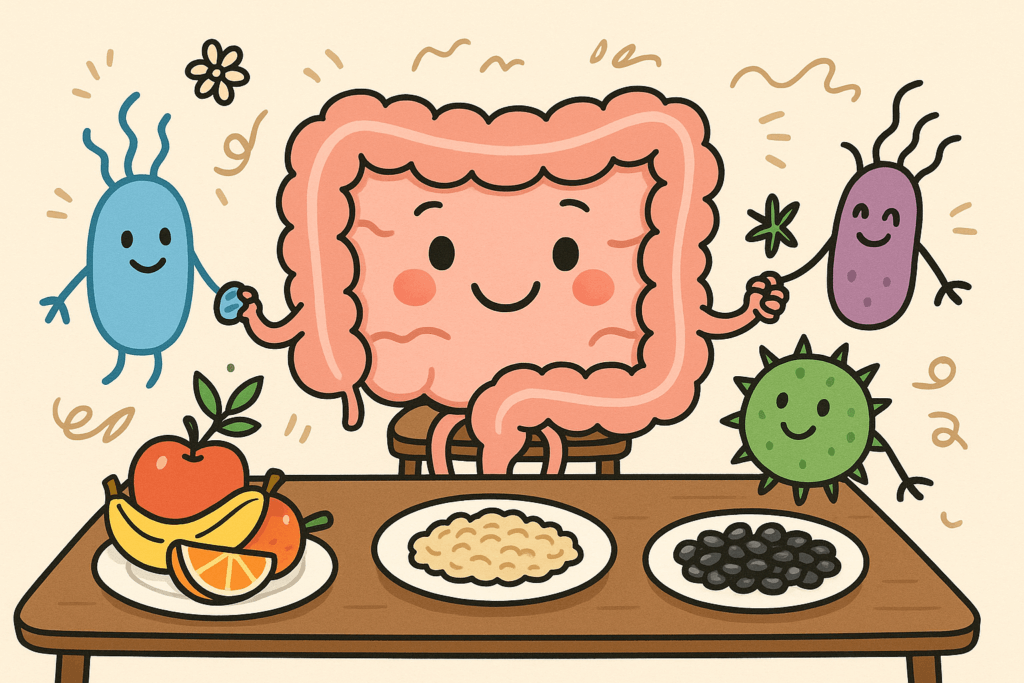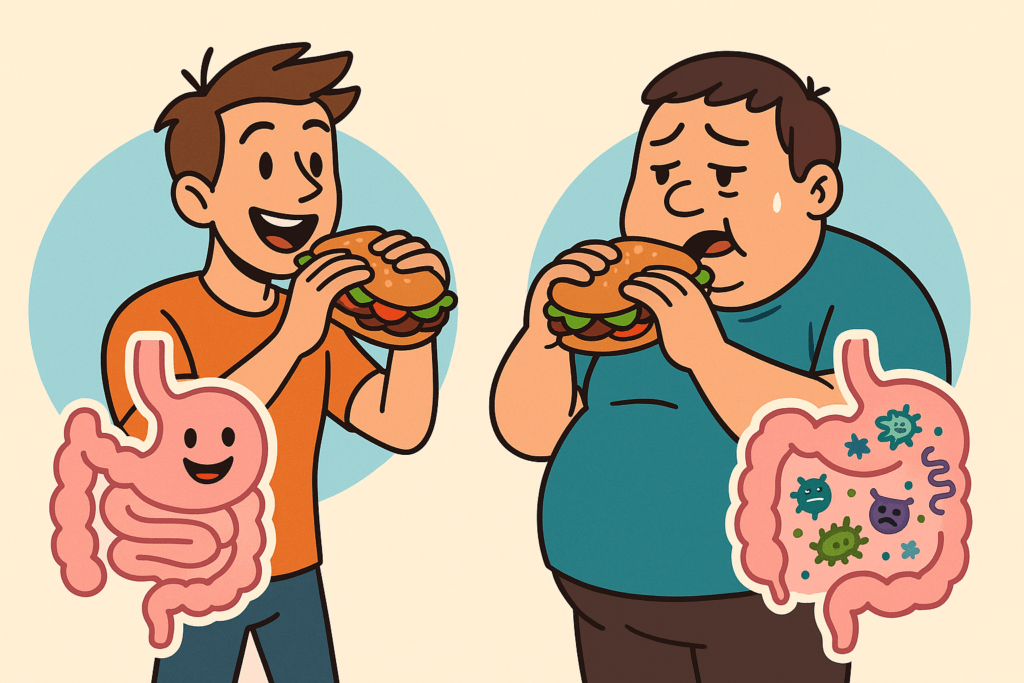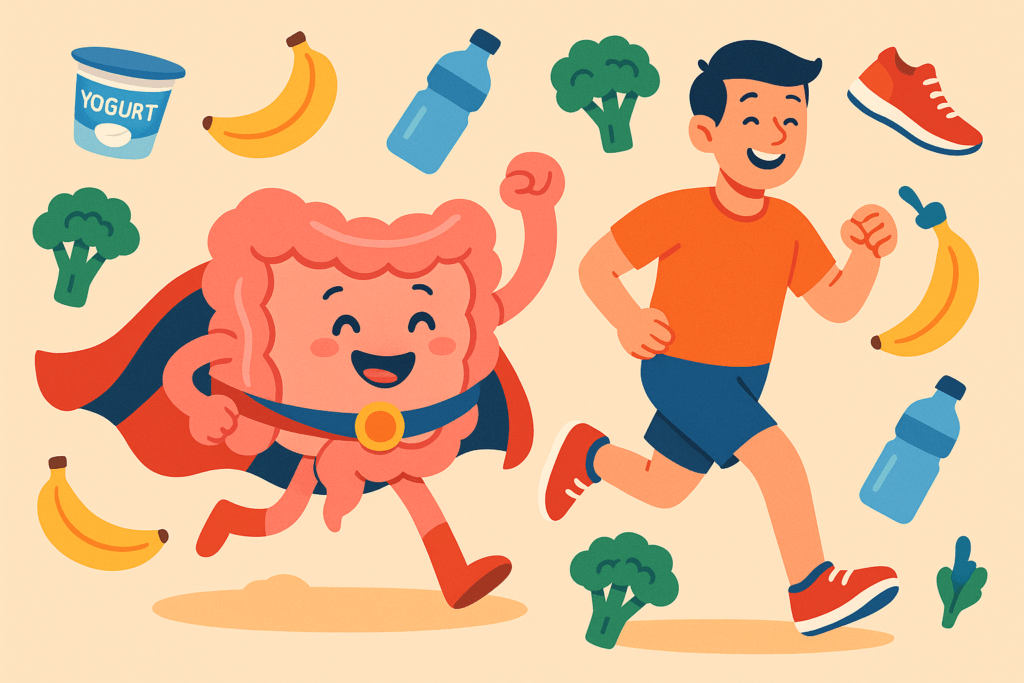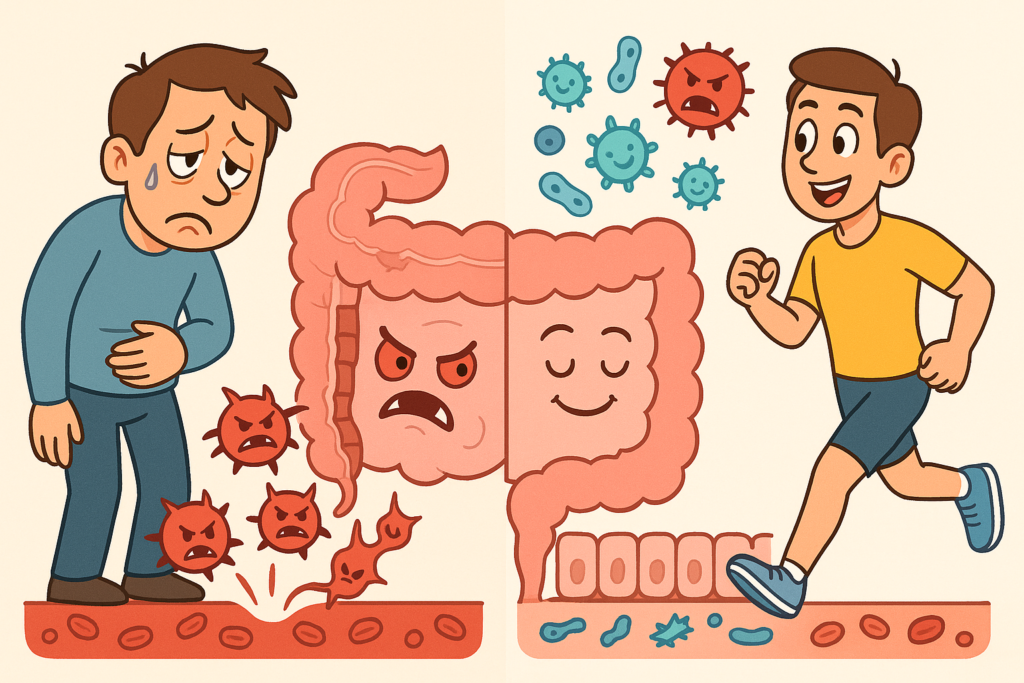If you’ve ever wondered How Gut Health Affects Fat Loss, the answer is far more complex than the old “eat less, move more” equation. Your gut is not just a digestive system — it is an intelligent hub, filled with trillions of bacteria, fungi, and microorganisms that control everything from metabolism to cravings. Scientists now call the gut our “second brain”, and research shows it has a major say in how easily you lose or gain fat.
In this detailed breakdown, we’ll uncover the science behind gut health and fat loss, practical ways to improve gut balance, and what challenges remain in research.
Gut Microbiome: Your Inner World
Inside your gut lives an ecosystem of more than 100 trillion microorganisms. This collective is called the gut microbiome. Its diversity and balance determine how efficiently your body digests food, extracts energy, and even signals when you’re full.
Why it matters for fat loss:
- A diverse microbiome means better metabolic flexibility — the ability to switch between burning carbs and fat.
- A imbalanced microbiome (low diversity, more harmful bacteria) can promote inflammation, increase fat storage, and slow fat burning.
- Studies show lean people often have different ratios of bacteria (like more Bacteroidetes and fewer Firmicutes) compared to obese people.

Example:
Two people may eat the same sandwich, but one’s gut bacteria might extract 100 extra calories compared to the other’s. Over time, those “invisible calories” can add up to weight gain.
In short, the type and balance of microbes inside you can tip the scale toward fat loss or fat gain.
How Gut Health Affects Fat Loss: The Scientific Pathways
1. Energy Harvesting & Calorie Absorption
Gut bacteria act like “calorie accountants.” Some microbes are more efficient at pulling energy from food. People with more Firmicutes bacteria tend to absorb extra calories from carbohydrates and fat, compared to those with higher levels of Bacteroidetes.
- This means two people eating the same diet can gain or lose weight at very different rates.
- Higher Firmicutes-to-Bacteroidetes ratios are often found in obese individuals.
- Lean individuals tend to have more bacteria that promote fiber fermentation into SCFAs, which boost fat metabolism.
Your gut may be deciding how many calories you actually get from your plate — not just your willpower.
Lycopene: The Antioxidant Powerhouse for Heart, Skin, and Prostate Health
2. Inflammation & Metabolism
Poor gut health can lead to “leaky gut,” where the intestinal lining weakens. This allows inflammatory compounds to escape into the bloodstream. Chronic inflammation creates a perfect storm for fat storage:
- Insulin resistance develops → cells don’t respond well to insulin, so glucose is stored as fat.
- Metabolism slows down → the body becomes less efficient at burning fat.
- Fat storage signals increase → hormones shift in favor of storing energy instead of using it.

Inflammation also affects muscle tissue, reducing its ability to take up glucose for energy, meaning fewer calories are burned and more fat is stored.
3. SCFAs: Small Molecules, Big Impact
When good bacteria digest dietary fiber, they produce short-chain fatty acids (SCFAs) such as:
- Butyrate → nourishes the gut lining, reduces inflammation, and improves insulin sensitivity.
- Propionate → influences appetite by signaling fullness to the brain.
- Acetate → regulates fat storage and may reduce cholesterol.
Why SCFAs matter for fat loss:
- They directly improve fat metabolism.
- They reduce hunger, helping you naturally eat less.
- They support a healthier gut barrier, preventing “leaky gut” and systemic inflammation.
For example, resistant starch foods (like cooked and cooled potatoes, oats, and legumes) increase SCFA production, leading to improved satiety and fat burning.
4. Hormones, Appetite & Cravings
The gut microbiome communicates with the brain through the gut-brain axis. This two-way link regulates hunger, cravings, and mood.
- Ghrelin (hunger hormone): Bad gut balance can cause elevated ghrelin, making you hungrier.
- Leptin (satiety hormone): Dysbiosis reduces leptin sensitivity, so you don’t feel full after meals.
- GLP-1 & PYY: Good gut bacteria increase these hormones, which help regulate appetite and blood sugar.
This explains why people with poor gut health often struggle with sugar cravings, emotional eating, and overeating. Supporting gut bacteria can reset hunger cues and make fat loss feel easier.
5. The Gut Barrier & “Leaky Gut”
Your intestinal lining works like a protective filter, letting nutrients in and keeping toxins out. When this barrier is compromised:
- Harmful substances like endotoxins leak into circulation.
- The immune system reacts, raising inflammation.
- Inflammation interferes with fat metabolism and promotes storage.
A weak gut barrier can make fat loss almost impossible, as the body is constantly fighting inflammation instead of burning energy efficiently. Strengthening the gut barrier with fiber, probiotics, and healthy fats is critical for long-term weight management.

How to Improve Gut Health for Easier Fat Loss
Knowing How Gut Health Affects Fat Loss is one thing — but how do you use it to your advantage? Here are practical, evidence-backed steps:
1. Eat More Fiber
- Aim for 25–35g of fiber per day from vegetables, fruits, legumes, whole grains.
- Include resistant starch foods like lentils, green bananas, cooled rice/potatoes.
- Fiber feeds the good bacteria, increases SCFA production, and reduces appetite.
2. Add Probiotics & Fermented Foods
- Natural sources: yogurt, kefir, kimchi, sauerkraut, miso, tempeh.
- Probiotic supplements with strains like Lactobacillus and Bifidobacterium can improve fat metabolism.
3. Cut Back on Processed Foods
- Processed sugar and refined carbs feed harmful bacteria.
- Artificial sweeteners like aspartame may also negatively affect the microbiome.
4. Move Your Body
- Regular exercise boosts microbiome diversity.
- Even 30 minutes of walking can improve gut balance.
- Active individuals often have higher levels of bacteria linked with leanness.
5. Sleep & Stress Management
- Sleep deprivation alters gut bacteria and increases cravings.
- Chronic stress releases cortisol, which promotes fat storage.
- Meditation, yoga, and good sleep hygiene improve both gut health and fat loss.
6. Stay Hydrated
- Water supports digestion and helps good bacteria thrive.
- Proper hydration also prevents constipation, keeping waste and toxins moving out.

Real Research Backing Gut Health & Fat Loss
- Resistant starch improves weight management: Supplementation in overweight adults enhanced fat loss and improved metabolic markers.
- Microbiome diversity increases with weight loss: Leaner individuals tend to have more varied gut bacteria.
- Obesity linked to microbiome imbalance: Higher ratios of Firmicutes to Bacteroidetes are common in obesity, driving fat storage.
Challenges & Limitations in Research
While evidence is exciting, there are still open questions:
- Gut microbiomes are unique like fingerprints, so one diet may not fit all.
- Scientists are still identifying which probiotic strains are most effective.
- Lifestyle factors (stress, medications, pollution) also play a big role in shaping your microbiome.
FAQs
1. What is microbiome diversity, and why does it matter for fat loss?
Diversity means having a wide variety of bacteria species. More diversity leads to better metabolism and improved fat loss outcomes.
2. Do probiotics really reduce belly fat?
Yes, specific strains like Lactobacillus and Bifidobacterium have shown reductions in visceral fat and waist circumference in clinical trials.
3. How does resistant starch support fat loss?
It feeds good bacteria, boosts SCFA production, enhances insulin sensitivity, and improves satiety.
4. What’s the connection between inflammation and fat storage?
Chronic inflammation from gut imbalance interferes with insulin, making the body store more fat and burn less.
5. Can diet quickly change my gut microbiome?
Yes, shifts can occur within days, but long-term improvements require consistency and sustained healthy eating.
Disclaimer
This article is for educational purposes only. It is not medical advice. Scientific studies support the connection between gut health and fat loss, but individual results may vary. Always consult a qualified healthcare professional before making significant changes to your diet, lifestyle, or supplements — especially if you have medical conditions.
